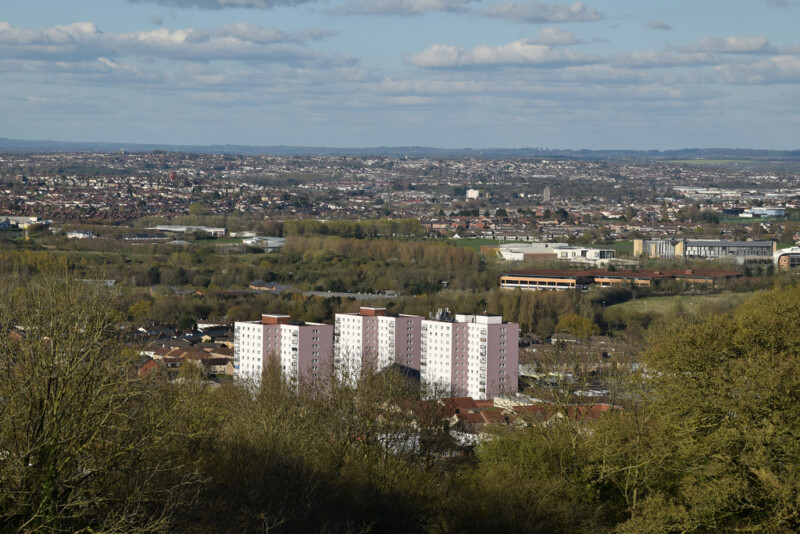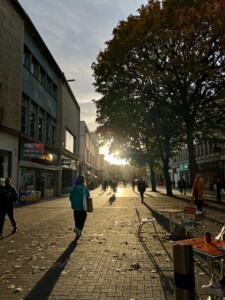What Happened to the Ladder? Social Mobility in Bristol

Share this
Looking only at the crudest of gross domestic product (GDP) measures, you could be forgiven for characterising Bristol’s economic growth story as one of unabated success: it is one of the only UK cities that is a net contributor to Treasury. Other than Glasgow, it is the only city outside London in which there are more people with degrees than people without them. Its culture sector is globally celebrated. It is a strikingly young city, with a median age of 32.4 compared to the national average of 40.2, marking it as somewhere that talented, educated young people from across the country and across the world choose to make their home. At the same time, it is a city that is proudly diverse, with at least 45 religions, 187 countries of birth and 91 main languages spoken by people living here. But who gets a stake in contributing to and benefiting from the city’s economic success is a hotly contested issue.
It is not uncommon to hear Bristol referred to as ‘a tale of two cities’. It has some of the most profound socioeconomic, racial and spatial inequalities in the country. For a city with fewer than half a million residents, the extent to which your life outcomes are dependent on where in Bristol you happen to be born, who your parents are, the colour of your skin and the school you attend is remarkable. In 2017, the government’s Social Mobility Commission ranked Bristol as one of the least socially mobile urban areas in the country, placing it in the worst performing ten per cent of local authorities for people from disadvantaged backgrounds going on to improved life outcomes. For a place filled with educated young people from outside its boundaries, a woeful one in 60 of the disadvantaged young people who grow up here will go on to attend a highly selective university such as the one right on their doorstep: the University of Bristol. With education levels seen as one of the key markers of social mobility, the spatial divisions here are prominent, with almost all pupils in Clifton and Redland progressing to higher education as opposed to just 8.7 per cent in Hartcliffe – one of the lowest-performing neighbourhoods in England. On racial inequality, the city performs similarly poorly, with a landmark study by the Runnymede Trust in 2017 (Bristol: A City Divided?) ranking Bristol the seventh most racially unequal local authority out of 348 in the country, and the most unequal of all Core Cities (the 11 biggest cities outside London).
This is not to say that Bristol’s poor performance in bridging inequalities stands in contrast to an exemplary national picture. The UK’s experience of recent years, characterised by political and economic turmoil and economic shocks, has shown that national progress on social mobility is not linear. In fact, mobility has now been stalling for several years, with wealth inequality across generations persistently high across the UK. And, while research shows that the children of higher-earning parents go on to earn more themselves, it is wealth – not just earnings – that marks the clearest dividing line. Even among those whose parents earn the same amount, children of parents with more wealth are more likely to go on to earn more themselves and to reach the top of the wealth distribution. Given this, we need to think about social mobility not just in terms of generation-on-generation earning power, but in terms of assets and ownership. In a rentier economy, this means that even as today’s young person makes all of the decisions they have been told by society will lead to upward mobility, the goal posts of economic security are continually shifting out of reach.
This poses a major challenge for the future of social mobility in Bristol, because the main route to achieving wealth – property ownership – is increasingly unattainable through decent wages alone. This is a national problem but is particularly acute here. Having seen some of the highest increases in the UK, property prices in Bristol have effectively doubled over the past decade. This would not be as prohibitive a barrier to mobility if we had an adequate social housing stock, or devolved powers for the local authority to impose the rent controls that would help to curb our overheated and underregulated private rental market, both of which the local authority has lobbied the government hard for.
With this double problem of deep-seated inequality and a worsening housing crisis, we are standing dangerously close to the precipice of an entrenched reality for Bristol, whereby economic security is the preserve of the intergenerationally wealthy. If there is a social mobility ladder, only its first few rungs are assailable now. How many will there be for future generations to climb?
All of this reflects my own experience. Born in the early nineties to a single parent on a council estate in Blackburn, a post-industrial town in North West England with some of the worst child poverty rates in the country, university was not only something of which my family had no experience, but a distant concept I never considered a real possibility. One thing poverty and instability robs you of is the luxury of thinking too far into the future beyond survival. It was only a chance meeting with a persistent college careers adviser adamant that ‘you should be going to Oxbridge!’ that nudged the course of my life onto a markedly different path. Thanks to the lightbulb ignited by this comment, an encouraging mum and a few years of determined study funded by loans and part-time work, I found myself with a ticket to the gates of upward mobility – an Oxbridge degree.
As a recent graduate sleeping at my mum’s mouldy rented studio flat, with the resolution that I would forge a career trying to play a part in addressing the structural inequities I had seen and experienced first-hand, I lacked the social capital and connections to land me a role in Westminster. It was seeing the incumbent mayor of Bristol speaking passionately to these issues on the national news that drew me, like so many other young people, to our city in 2017. A Black man of mixed heritage raised in poverty by a single mother in Bristol, Marvin Rees was the type of politician whose relative absence was conspicuous on the national stage. I was inspired by his vision. Luckily, there happened to be a paid internship advertised in his office at the time. Having secured the position, in no small part due to speaking of my own story of burgeoning social mobility in the interview, a door was cracked open for me in Bristol.
Working alongside a mayor whose fundamental mission is that of tackling the city’s socioeconomic, spatial and racial inequities, I was afforded the opportunity to build social capital from scratch in a way that would have been far more challenging in London. With Rees centralising opportunity creation in his leadership approach, I was able to make progress into increasingly senior roles and was entrusted to lead on mayoral priorities close to my heart, such as programmes to tackle adverse childhood experiences and period poverty. The nature of collaborative city governance fostered by Rees – characterised by the One City Approach – meant that lived experience was regarded as an asset in those with a role in making decisions about the city’s future. The experience and connections I built during this time at City Hall enabled me to move into a senior role at a Westminster think tank, while continuing to call Bristol home and work with organisations in the city on issues related to economic inclusion. This would not have been possible without a foot in the door from a city administration committed to ensuring nobody is left behind. But, despite Bristol providing a springboard in so many ways, the security of home ownership and escape from the insecure rental market remains elusive, as is the case for thousands of others in the same boat.
For the social contract of social mobility to be strengthened in the future rather than torn up further, local leaders, politically but also across all sectors, need to continue to prioritise tackling inequality, ensuring a joined-up approach to addressing other challenges such as the transition to net zero, and bringing everybody along on that journey. In terms of what national government can do, alongside an industrial strategy that would help make business investment as attractive as property ownership for wealth creation, those with skin in the game who understand the complexities of Bristol’s challenges need to be given the tools and the trust to make the long-term decisions that would meaningfully turn the tide. This means being able to take a whole place approach to enhancing business investment while driving the improvements in health, housing, skills and education that underpin social mobility.
And at a time when young people are significantly worse off than older generations were at their age, governments must have more commitment to redressing radical disparity between age groups. A starting point would be to take seriously recent recommendations from the Intergenerational Commission, including meaningfully reforming the rental market to give renters better rights and protections, reform of the capital gains and inheritance tax systems that are currently helping to entrench inequality, and a new regime for property tax that taxes more wealth at a lower threshold. A brave shift that meaningfully makes way for mobility is not a ‘nice to have’, but vital to securing our city’s future success story as one that we can all contribute to and benefit from.

Annabel Smith is Head of Place & Practice at the Centre for Progressive Policy and is responsible for leading its Inclusive Growth Network, working with cities and regions across the UK to drive local inclusive growth.
This article appears in Bristol 650: Essays on the Future of Bristol, a book bringing together essays from over 30 contributors, addressing some of the challenges the city faces and sharing ideas about how we might meet them. From dealing with the past, the future of social care, culture and housing to building a city of aspiration, the book looks to promote learning about the future of Bristol and encourage new ideas to come forward.
Free copies of Bristol 650: Essays on the Future of Bristol will be available at selected Festival of the Future City events in October 2023, or you can find articles featured in the book at bristolideas.co.uk/bristol650book.

